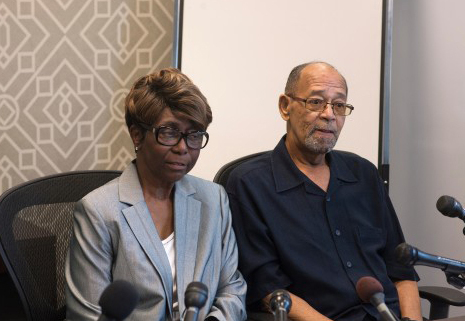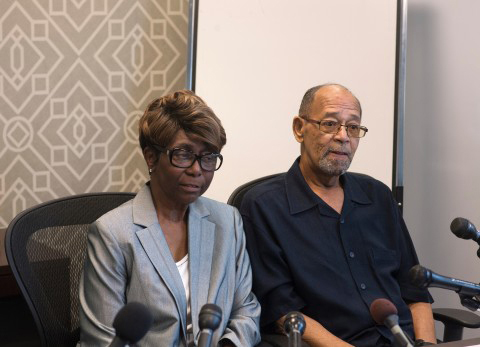Father Aitcheson also covers an overdue civil payment, but his victims neither forget nor forgive.
It took 40 years, but a Catholic priest who used to be in the Ku Klux Klan finally apologized to the black couple he targeted in a cross burning.
William Aitcheson told Phillip and Barbara Butler how he was “blinded by hate and ignorance” when he targeted the then-newlywed couple who had just moved to the neighborhood. He rejected those beliefs before entering the priesthood but was too ashamed to face the Butlers, he wrote.
“I believe now that all people can live together in peace regardless of race,” he said in a letter, dated Sept. 8. “I also know that the symbol of the most enduring love the world has even known must never be used as a weapon of terror. Its use against you was a despicable act. I seriously regret the suffering it caused you.”
The Butlers and their attorney, Ted Williams, spoke in a news conference Friday about Aitcheson’s letter, and recent payment to the Butlers of $23,000 from an overdue civil suit judgment along with $9,600 in attorney fees. Aitcheson’s attorney could not be immediately reached for comment.
Although Aitcheson was no longer under any legal obligation to pay the Butlers, he felt a moral obligation and used his private funds and a personal loan to make the payment, the Catholic Diocese of Arlington wrote in a statement. The Butlers declined a meeting with Aitcheson, so he wrote “a genuine apology through a hand-written letter,” the diocese wrote.
“Fr. Aitcheson acknowledges that he should have reached out to the Butler family and paid restitution decades ago, but he hopes this resolution begins a process of healing and peace,” the diocese wrote.
In his letter, Aitcheson explained to the Butlers that it took him so long to apologize because he was ashamed of his actions.
“It’s no excuse. I understand that. But it is the truth. I didn’t know how to deal with it,” he wrote. “You deserved an apology, but I did not demonstrate the strength needed to face you.”
As a Catholic, Phillip Butler said he wants to be able to forgive Aitcheson now that he has confessed his sins, but said he is not ready.
“That’s what they preach, but then you have to give it from your heart and say, ‘OK, I’m going to do that,'” Butler said about forgiveness, motioning to his heart. “I can’t do it yet.”
The Butlers only recently heard from Aitcheson after he penned an essay about redemption, claiming that the violence at the deadly white supremacist rally in Charlottesville, Virginia, made him think of his “despicable” actions with the Ku Klux Klan.
The Butlers doubt the sincerity of his confession, saying he wrote the essay only because a freelance reporter who introduced herself as a parishioner contacted the diocese about Aitcheson’s radical past.
“For you to say that you’re sorry? No, you’re not sorry,” said Barbara Butler, as if speaking directly to Aitcheson. “You’re sorry that you got caught.”
Most recently, Aitcheson was a parochial vicar, or assistant to the pastor, at St. Leo the Great church in Fairfax City, where he had been for four years before temporarily stepping down from his post.
“As this matter involving the Butler family and Fr. Aitcheson has only been resolved recently, plans for his future priestly ministry are still being discerned,” the diocese wrote in a statement Friday.
Forty years ago, Aitcheson was a University of Maryland student and a KKK member who was eventually deemed “too radical and violent” for the main KKK branch, which threw him out, according to FBI files.
He led a group called the “Klan Beret” and prepped to blow up a local NAACP branch and a power plant and communications center at Fort Meade, Maryland, an undercover agent testified. The group had burned five other crosses in Prince George’s County, including at two Jewish institutions. Aitcheson was sentenced in 1977 to 90 days in a federal medical prison with four years probation by a judge who told him, “I don’t believe you are a bad person.”
Aitcheson was targeted in a class-action lawsuit, filed in federal court, which was resolved in 1982 with $23,000 in damages awarded to the Butlers and $1,500 apiece to Beth Torah Congregation and B’nai B’rith Hillel Foundation of College Park. It was unclear whether Aitcheson also paid the Jewish groups.
In October 1981 Aitcheson wrote a letter to the judge detailing how his life had changed, saying that he had held jobs as a florist driving a delivery truck, a shoe salesman and a garment factory worker, earned his teacher certificate and started teaching.
“I am truly sorry for the harm I did,” Aitcheson wrote to the judge. “I regret my association with that organization; my thinking has so totally changed in the last five years, it would be inconceivable for me to ever resume that part of my life.”
Eventually, Aitcheson decided to become a priest. He was ordained for what was then the diocese of Reno-Las Vegas in 1988 at age 33, and in brief comments in August, the Rev. Robert Chorey, spokesman for the Reno diocese, said church leaders “understood at least part of his background” when they hired Aitcheson. “I have no record of their thought process.”
The Butlers are still angry about the cross burning and said the letter and money mean nothing to them. Neither are sure what Aitcheson could do to earn their forgiveness.
Send questions/comments to the editors.




Success. Please wait for the page to reload. If the page does not reload within 5 seconds, please refresh the page.
Enter your email and password to access comments.
Hi, to comment on stories you must . This profile is in addition to your subscription and website login.
Already have a commenting profile? .
Invalid username/password.
Please check your email to confirm and complete your registration.
Only subscribers are eligible to post comments. Please subscribe or login first for digital access. Here’s why.
Use the form below to reset your password. When you've submitted your account email, we will send an email with a reset code.